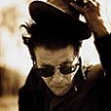Klikk på en bok for å legge inn et sitat.
Viser 1 til 10 av 12 sitater
Somewhere in the gray wood by the river is the huntsman, and in the brooming corn and in the castellated press of cities. His work lies all wheres and his hounds tire not. I have seen them in a dream, slaverous and wild and their eyes crazed with ravening for souls in this world. Fly them.
Mr Suttree in what year did your greatuncle Jeffrey pass away?
It was in 1884.
Did he die by natural causes?
No sir.
And what were the circumstances surrounding his death?
He was taking part in a public function when the platform gave way.
Our information is that he was hanged for a homicide.
In the toils of orgasm—she said, she said—she’d be whelmed in a warm green sea through which, dulled by the murk of it, pass a series of small suns like the footlights of a revolving stage, an electric carousel wheeling in a green ether. Envy’s color is the color of her pleasuring, and what is the color of grief? Is it black as they say? And anger always red? The color of that sad shade of ennui called blue is blue but blue unlike the sky or sea, a bitter blue, rue-tinged, discolored at the edges. The color of a blind man’s noon is white, and is his nighttime too? And does he feel it with his skin like a fish? Does he have blues, are they bridal and serene, or yellows, sunlike or urinous, does he remember? Neural colors like the fleeting tones of dreams. The color of this life is water.
Supposing there be any soul to listen and you died tonight?
They'd listen to my death.
No final word?
Last words are only words.
You can tell me, paradigm of your own sinister genesis construed by a flame in a glass bell.
I'd say I was not unhappy.
You have nothing.
It may be the last shall be first.
Do you believe that?
No.
What do you believe?
I believe that the last and the first suffer equally. Pari passu.
Equally?
It is not alone in the dark of death that all souls are one soul.
Of what would you repent?
Nothing.
Nothing?
One thing. I spoke with bitterness about my life and I said that I would take my own part against the slander of oblivion and against the monstrous facelessness of it and that I would stand a stone in the very void where all would read my name. Of that vanity I recant all.
He looked at a world of incredible loveliness. Old distaff Celt's blood in some back chamber of his brain moved him to discourse with the birches, with the oaks. A cool green fire kept breaking in the woods and he could hear the footsteps of the dead. Everything had fallen from him. He scarce could tell where his being ended or the world began nor did he care. He lay on his back in the gravel, the earth's core sucking his bones, a moment's giddy vertigo with this illusion of falling outward through blue and windy space, over the offside of the planet, hurtling through the high thin cirrus.
One spring morning timing the lean near-liquid progress of a horse on a track, the dust exploding, the rapid hasping of his hocks, coming up the straight foreshortened and awobble and passing elongate and birdlike with harsh breath and slatted brisket heaving and the muscles sliding and bunching in clocklike flexion under the wet black hide and a gout of foam hung from the long jaw and then gone in a muted hoofclatter, the aging magistrate snapped his thumb from the keep of the stopwatch he held and palmed it into his waistcoat pocket and looking at nothing, nor child nor horse, said anent that simple comparison of rotary motions and in the oratory to which he was prone that they had witnessed a thing against which time would not prevail.
He meant a thing to be remembered, but the young apostate by the rail at his elbow had already begun to sicken at the slow seeping of life. He could see the shape of the skull through the old man's flesh. Hear sand in the glass. Lives running out like something foul, nightsoil from a cesspipe, a measured dripping in the dark. The clock has run, the horse has run, and which has measured which?
What deity in the realms of dementia, what rabid god decocted out of the smoking lobes of hydrophobia could have devised a keeping place for souls so poor as is this flesh. This mawky worm-bent tabernacle.
In the long days of fall they went like dreamers. Watching the sky for rain. When it came it rained for days. They sat in groups and watched the rain fall over the deserted fairgrounds. Pools of mud and dark sawdust and wet trodden papers. The painted canvas funhouse walls and the stark skeletons of amusement rides against a gray and barren sky.
A sad and bitter season. Barrenness of heart and gothic loneliness. Suttree dreamed old dreams of fairgrounds where young girls with flowered hair and wide child's eyes watched by flarelight sequined aerialists aloft. Visions of unspeakable loveliness from a world lost. To make you ache with want.
Hard weather, says the old man. So may it be. Wrap me in the weathers of the earth, I will be hard and hard. My face will turn rain like the stones.
How surely are the dead beyond death. Death is what the living carry with them. A state of dread, like some uncanny foretaste of a bitter memory. But the dead do not remember and nothingness is not a curse. Far from it.









































